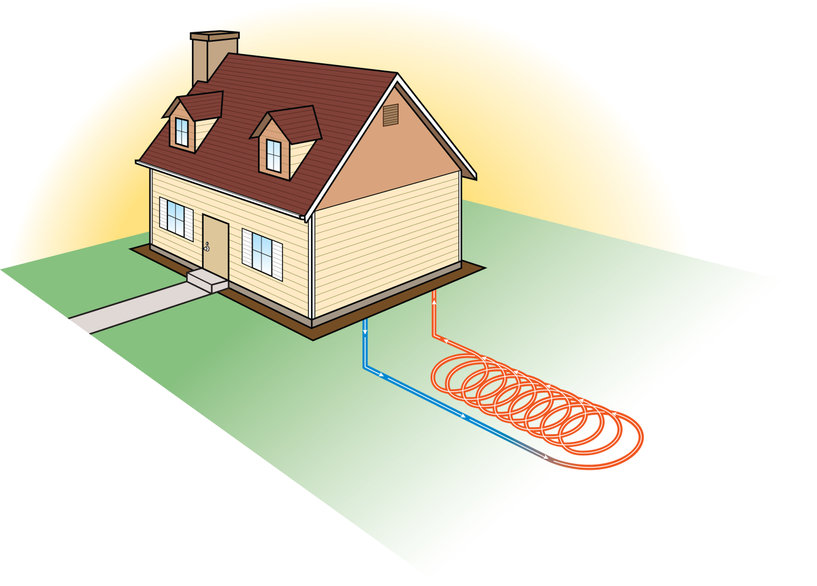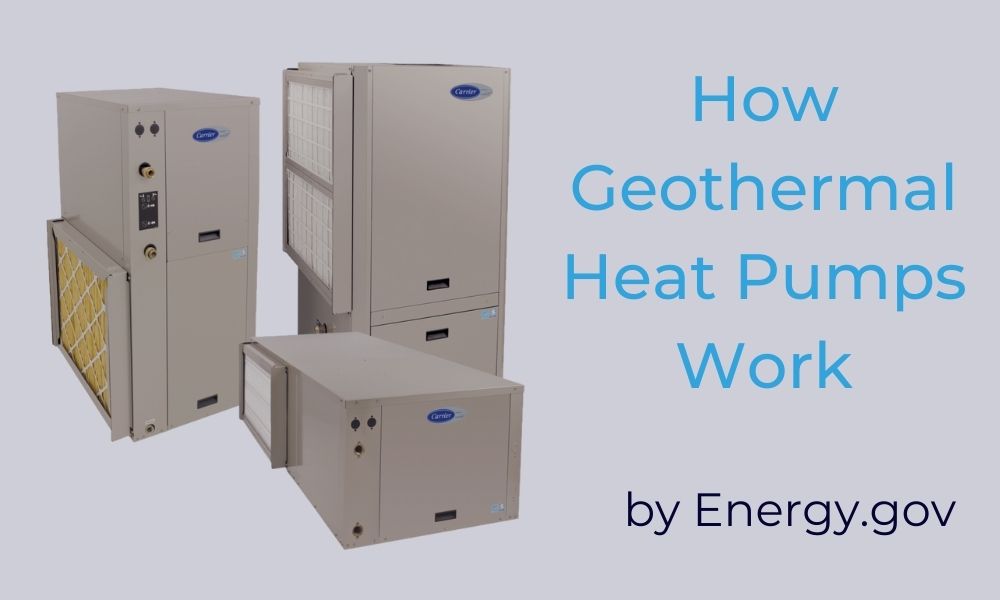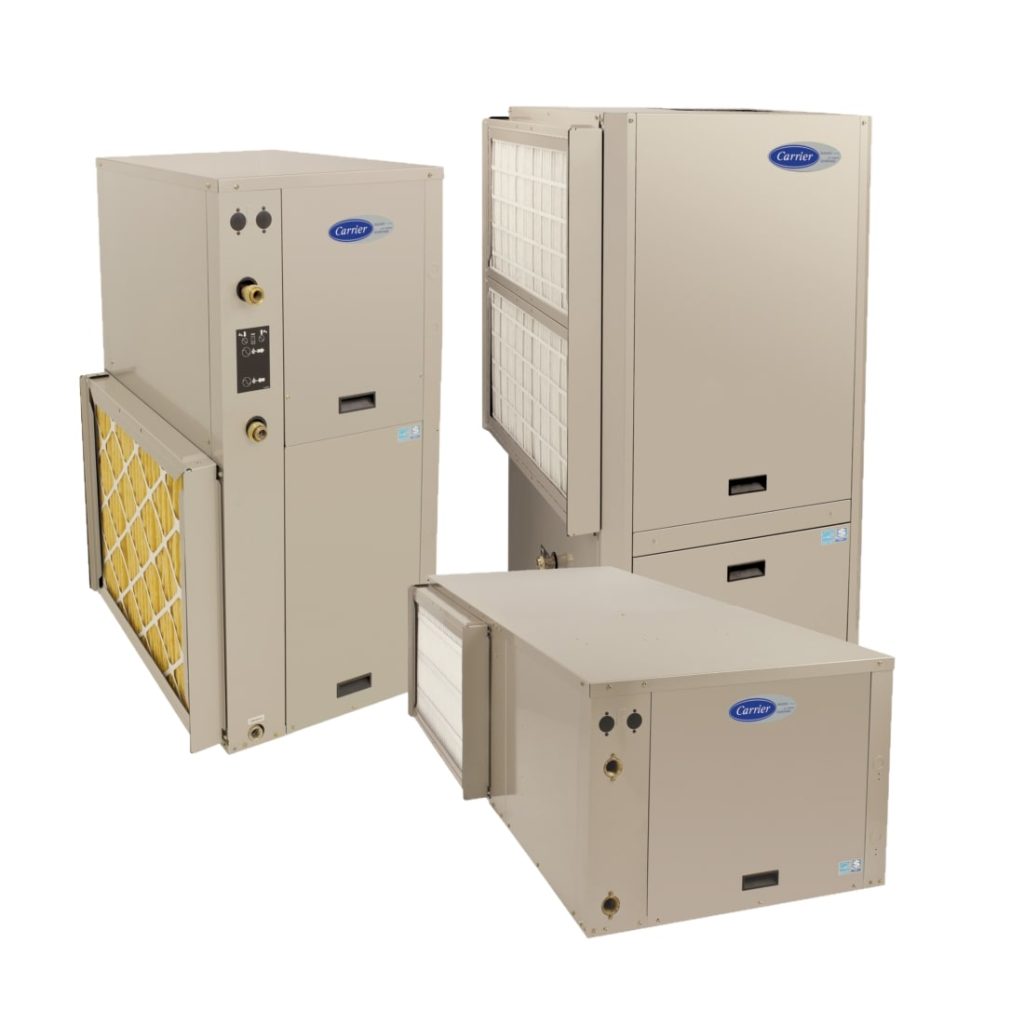Geothermal heat pumps, also known as ground-source or water-source heat pumps, are growing in popularity in the United States. And, with good reason. These ultra-efficient heat pumps use the temperature in the earth as its heat exchange source, rather than the outside air, to provide heated and cooled air. This allows the heat pump to have access to a consistent temperature source which enables it to supply sufficient heated or cooled air in extreme outside temperatures.
To better explain the details of what a geothermal heat pump is exactly, let’s compare it to an air-source heat pump since that is what we are more accustomed to.
Geothermal Heat Pump vs Air-Source Heat Pump
An air-source heat pump uses the energy from the outside air to provide heated air. Because these traditional heat pumps use the outside air as its source, they can struggle to provide adequate heated air in extreme temperatures (below 32 degrees Fahrenheit). When providing heat, these heat pumps pull in air from outside. If it’s extremely cold out, there won’t be much available warm air to capture and put to use.
But, it doesn’t stop there.
Air-source heat pumps can also struggle to provide adequate cooled air in the Summer when it’s extremely hot outside (above 90 degrees Fahrenheit). This is because a traditional heat pump pulls in warm air from inside a home and transfers the heat outside. If the outside temperature is extremely hot, like the Summers get around here in Jackson, TN, then it makes the heat exchange process much more difficult and less efficient.
The Benefit of Geothermal Energy
Geothermal heat pumps, on the other hand, use the ground for its exchange source. The average ground temperature ranges from about 45 degrees to 75 degrees Fahrenheit. This temperature range is a perfect sweet spot for a heat pump to operate at its peak ability. The point here is that it’s much easier for a heat pump to provide proper heating and cooling if the source it is using isn’t too warm (for cooling purposes) and isn’t too cold (for heating purposes).
So, if you are worried about the common complaint that air-source heat pumps struggle to provide adequate heat in extremely cold temperatures, a geothermal heat pump might be just what you need.
How Does a Geothermal Heat Pump Work?
A geothermal heat pump operates similarly to a air-source heat pump. The main difference is the temperature source, as we’ve already stated. Since these ground-source heat pumps use the ground as their source to provide and expel heat, a large portion of the system is installed underground. There are 2 main underground setups for a geothermal heat pump system. These include:
- Closed Loop Systems
- Open Loop Systems

Closed Loop Systems
Closed loop systems have water (often mixed with antifreeze) inside the underground lines. These lines circulate the water underground which then absorbs the geothermal energy (typically around 50 degrees Fahrenheit).
For heating purposes, the geothermal energy is transferred up to the above ground portion of the heat pump system. The energy is then completely transformed into heated air and is dispersed into the home to provide the desired heating affect.
For cooling purposes, warm air is captured from inside the home and the heat is transferred out underground. The remaining air inside the lines, which has been relieved of heat, is transformed into cool air through compression and refrigerant. This cool air is then dispersed into the home to provide the desired cooling affect.
Open Loop Systems
Open loop water-source systems operate in a similar way to closed loop systems. The only difference is that open loop systems use a water source, such as a well, to gather water from. Picture a body of water with one line that pulls water from the body of water and one line that releases circulated water back into the body of water. As you can see, the system is open.
A closed loop system is closed and simply circulates the water within the system over and over.
The video below by the U.S. Department of Energy further explains how geothermal heat pumps work.

Related: How Does an Air Conditioner Work?
What About Cost?
When it comes to cost, a geothermal heat pump system costs quite a bit more than a traditional air-source heat pump system. This is primarily due to the labor and material costs of the underground portion of the system. The total cost for a geothermal heat pump system, including installation, can range anywhere from about $12,000 up to $35,000 or more in some cases. Compare this to the average price range of a traditional air-source heat pump system of around $4,000 – $10,000+ and you can see that the geothermal option can cost up to 3 times as much or more.
But, don’t let that scare you off.
Because geothermal systems are so much more efficient (up to 70% more in some cases), the difference in cost, when compared to an air-source heat pump, can be returned in savings within 5-10 years. These systems also tend to last much longer than traditional heat pump systems, which increases their value even more. And, to top it off, you can take advantage of U.S. tax rebates for geothermal systems and save up to 26% on a new system!
And, remember, most HVAC companies offer HVAC financing options which allow you to split up the full cost into monthly payments. Many options come with payments that have very low interest rates and some with no interest at all.
Conclusion
Geothermal heat pumps are highly regarded as the top choice for a HVAC system because of their consistent performance, efficiency, and longevity. While much of their above-ground operations are similar to traditional air-source heat pumps, the underground portion of the system is what sets them apart. Using the earth’s temperature as its exchange source, rather than the fluctuating outside air temperature, is what makes these geothermal systems so effective.
But, to have the best, you have to pay for the best. For many, the cost is worth it. Is it worth it to you?
Feel free to share your thoughts, experience, and opinions below in the comments section! We’d love to hear from you.



